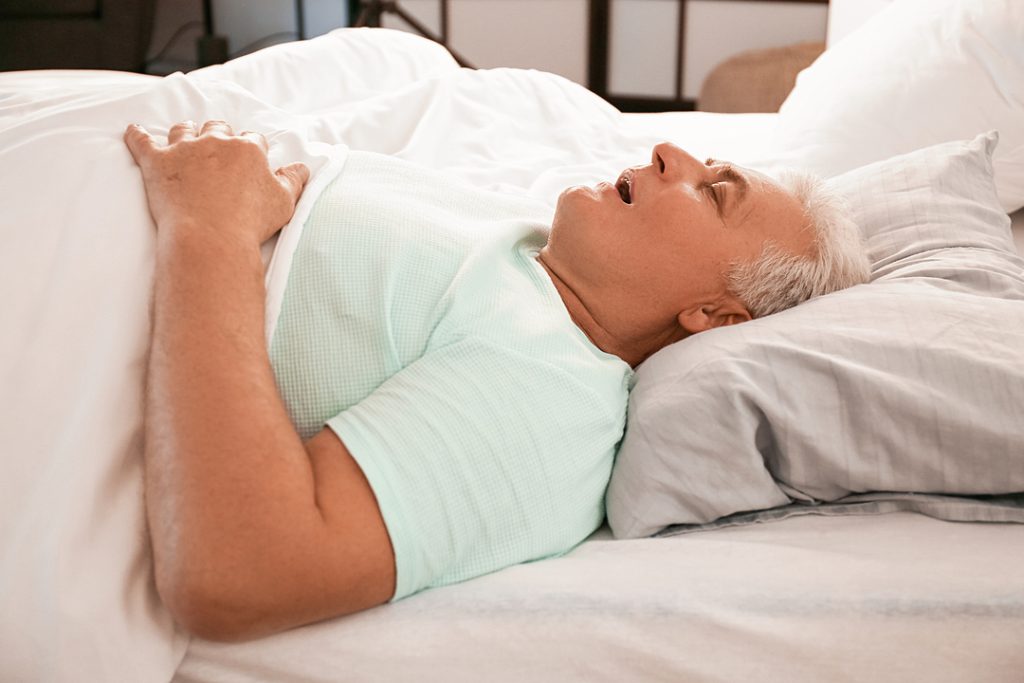Service Connecting VA Sleep Apnea Secondary to Weight Gain as an Intermediate Step
By Telemedica
1/13/2025
Table of Contents
- Key Takeaways
- What is Obstructive Sleep Apnea (OSA)?
- What Is Obesity?
- Connections Between Weight Gain and Obstructive Sleep Apnea (OSA)
- VA Sleep Apnea Secondary to Weight Gain Claim
- Service Connecting VA Sleep Apnea Secondary to Weight Gain
- Do I Need a Nexus Letter for VA Sleep Apnea Secondary to Weight Gain?
- Medical Evidence Wins VA Claims
For many veterans, sleep apnea is not just an isolated condition—it’s linked to other issues like weight gain, medication side effects, or service-connected physical limitations. Fortunately, you may be able to connect these factors through an intermediate step making a case for sleep apnea as secondary to your existing conditions. In this post, we’ll explain how it’s possible to service connect VA sleep apnea secondary to weight gain (as an intermediate step).
Key Takeaways
- A 10% increase in weight can dramatically increase the risk of obstructive sleep apnea (OSA).
- Weight gain/obesity are not VA ratable conditions.
- Because weight gain may “aggravate” OSA, it’s possible to use a secondary intermediate step of weight gain for your VA sleep apnea claim.
- A Nexus Letter is valuable medical evidence that is often the missing link between your military service and a secondary service connection.

What is Obstructive Sleep Apnea (OSA)?
There are several sleep-related breathing disorders; the most common is obstructive sleep apnea (OSA). Obstructive sleep apnea occurs due to the relaxation of the throat muscles, blocking the airway. If you have OSA, you are likely aware that with this type of sleep disorder, you stop and start breathing off and on during sleep. Other OSA symptoms include:
- Snoring loudly
- Excessive sleepiness during the day
- Difficulty focusing
- Waking during the night, choking or gasping
- Dry mouth and throat in the morning
- Morning headaches
- Mood changes (e.g., depression) from lack of adequate sleep
- High blood pressure
- Decreased libido (sex drive)
Additionally, sleep studies may use an Apnea-Hypopnea Index (AHI) indicator tool to measure how often your breathing slows or stops during sleep and is used to diagnose the severity of sleep apnea.
What Is Obesity?
Obesity is often diagnosed using an indicator called the “body mass index (BMI).” BMI is a measurement that takes into account your height and weight. The Centers for Disease Control and Prevention (CDC) reports that a healthy BMI ranges from 18.5 to 24.9.
A BMI of 25 to 29.9 means you are overweight; 30 or higher qualifies as obese. Although the CDC indicates that the BMI is not a reliable stand-alone measurement of obesity, the institution says other methods are not widely available and are difficult to standardize
Connections Between Weight Gain and Obstructive Sleep Apnea (OSA)
Weight gain is one of the most prevalent risk factors in developing a specific type of sleep apnea called obstructive sleep apnea (OSA). According to an American Academy of Sleep Medicine report, men who gained at least 22 lbs. were five times more likely to develop moderate to severe OSA; women with the same weight gain had a 2.5 times increased risk.
A 2024 American Journal of Health study shows sleep apnea is highly prevalent in veterans, and the incidence rises even with a 10% increase in body weight gain.
Obesity, Overweight, and Sleep Apnea
Why the close relationship between obesity and sleep apnea? Fat accumulation around the airway during sleep can contribute to OSA by reducing the size of the airway, making it more likely to collapse during sleep.
OSA disrupts certain hormone balances including:
- Increasing ghrelin (i.e., the hunger hormone) which increases appetite
- Lowering leptin levels which interferes with the body’s signal of fullness
These hormone imbalances contribute to increased hunger and often cause weight gain and obesity.

VA Sleep Apnea Secondary to Weight Gain Claim
Here’s a real-life scenario example of how a VA sleep apnea secondary to weight gain claim using an intermediate step could occur:
You receive benefits for a service-connected mental health condition, such as depression. Your weight gain was a symptom of depression, or it was caused by the medication you take for depression.
After leaving the military, you were diagnosed with sleep apnea; your sleep apnea has resulted in a 45-pound weight gain (above what you weighed during active duty). It’s possible to file a VA disability claim for sleep apnea secondary to depression with weight gain/obesity as an intermediate step.
Perhaps you take mental health medications that are well known to cause weight gain.
In the above scenario, it’s essential to explain that if you hadn’t gained weight from medications taken to manage your mental health symptoms, you wouldn’t have developed sleep apnea.
Note, this principle also applies when side effects from other medications (e.g., mood stabilizers, corticosteroids, or others) taken for an existing service-connected condition cause an increased appetite and weight gain causing sleep apnea.
Service Connecting VA Sleep Apnea Secondary to Weight Gain
Weight gain can be a bridge connecting disorders that occurred during your military service, such as mental health conditions or physical inactivity due to orthopedic, or other conditions) to weight gain and sleep apnea. Subsequently, when binge eating, reduced exercise ability, or other related factors contribute to your weight gain, it may eventually cause sleep apnea.
Although obesity is not included in the VA’s list of disability-qualifying medical conditions, under 38 CFR 3.310 (a), it may be an “intermediate step” to connect weight gain and obesity to sleep apnea.
Note: For more information on obesity as an intermediate step for secondary service connection see: M21-1, Part V, Subpart ii, Chapter 3, Section C (b-d)
Do I Need a Nexus Letter for VA Sleep Apnea Secondary to Weight Gain?
You’ll need a Nexus Letter that links your sleep apnea secondary to your service-connected condition (e.g., depression, or other condition) with weight gain as an interim link. Your letter should also provide a licensed provider’s medical opinion, explaining the following applicable scenarios:
- How your service-connected physical condition adversely impacted your ability to be physically active, leading to weight gain (or)
- How your depression symptoms, increased your appetite, resulting in weight gain (and/or)
- How your mental health prescriptions, or other applicable medications caused weight gain.
- How “it is as likely as not” that your weight gain caused or worsened your sleep apnea.
A Nexus Letter is a valuable resource that is often the missing link between your military service and a secondary condition VA disability rating approval for getting the disability compensation you rightfully deserve.
Related Posts
How a Sleep Apnea DBQ Can Support Your Claim
What to Know About a Sleep Apnea Nexus Letter
Medical Evidence Wins VA Claims
Did you know that a lack of medical evidence is the #1 reason VA disability claims are denied?
Medical evidence is a crucial piece of the puzzle that VA raters consider when reviewing a disability claim. Telemedica provides solutions for veterans looking to bolster their claims through high-quality medical evidence that wins claims!
Schedule your FREE 20-minute consultation and learn how to get the supporting medical evidence you need to strengthen your VA claim.